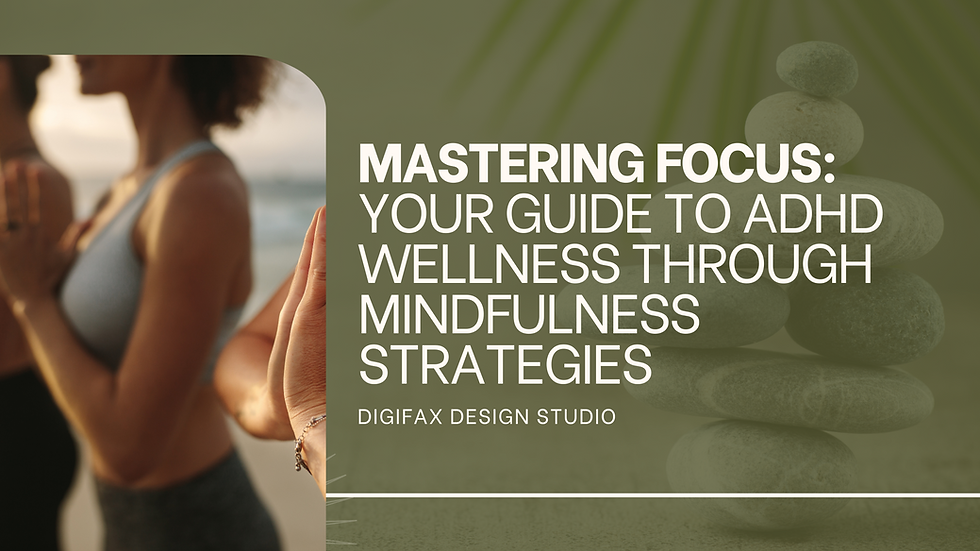The Impact of Healthy Eating on ADHD and Overall Health
- Megan Brewer

- Nov 10, 2024
- 3 min read
Updated: Feb 18
Attention Deficit Hyperactivity Disorder (ADHD) affects millions of people worldwide, influencing their ability to focus, control impulses, and manage daily tasks. While medication and therapy are common approaches to managing ADHD symptoms, nutrition plays a crucial yet often overlooked role in supporting overall health and cognitive function.

4 Reasons How Eating Better Helps with ADHD

1. Stabilizing Blood Sugar Levels
Fluctuations in blood sugar can exacerbate ADHD symptoms like inattention, irritability, and hyperactivity. Consuming balanced meals that include complex carbohydrates, lean proteins, and healthy fats helps maintain steady glucose levels, promoting consistent energy and concentration throughout the day.

3. Supporting Brain Function with Essential Nutrients
Certain nutrients are vital for optimal brain function and may influence ADHD symptoms:

Omega-3 Fatty Acids: Found in fatty fish (like salmon and sardines), flaxseeds, and walnuts, omega-3s are essential for brain health. Some studies suggest they may improve attention and reduce hyperactivity.

Iron and Zinc: These minerals play a role in cognitive development and neurotransmitter regulation. Foods rich in iron (spinach, red meat) and zinc (pumpkin seeds, chickpeas) can support mental clarity and focus.
Magnesium and Vitamin B6: Involved in neurotransmitter synthesis, these nutrients can help with mood regulation and cognitive function. Sources include whole grains, nuts, bananas, and avocados.

3. Reducing Inflammation
A diet high in processed foods, sugars, and artificial additives can lead to inflammation, which may impact brain function. Emphasizing whole, unprocessed foods can help reduce inflammation:

Anti-Inflammatory Foods: Berries, leafy greens, fatty fish, and spices like turmeric.
Avoiding Additives: Some individuals with ADHD may be sensitive to food dyes and preservatives.
4. Enhancing Neurotransmitter Production
Neurotransmitters like dopamine and serotonin are critical for attention and mood regulation. Adequate protein intake provides amino acids necessary for their production.

Protein Sources: Include a source of protein at each meal to support neurotransmitter synthesis.
Overall Health Benefits
Improving dietary habits doesn't just impact ADHD symptoms; it enhances overall well-being:

1. Boosting Energy Levels
Balanced nutrition provides the body with the fuel it needs, reducing fatigue and supporting physical activity.
2. Strengthening the Immune System
Vitamins and minerals from fruits and vegetables bolster immune function, helping prevent illnesses that can further disrupt routines.
3. Promoting Healthy Sleep Patterns
Nutrients like magnesium and tryptophan support restful sleep, which is essential for cognitive function and emotional regulation.
4. Supporting Digestive Health
A healthy gut microbiome is linked to improved mood and cognition. Consuming fiber-rich foods and probiotics aids digestive health.
Final Thoughts
Eating better is a powerful strategy for managing ADHD symptoms and enhancing overall health. By focusing on balanced nutrition, individuals with ADHD can support their brain function, improve mood, and increase energy levels. Implementing practical dietary changes can make a significant difference in daily life, contributing to better focus, productivity, and well-being.
Remember, every positive change counts. Embrace the journey towards healthier eating as a form of self-care that nurtures both the body and mind.
Take the Next Step
Ready to transform your eating habits?
Our ADHD-Friendly Menu Planning Recipe Book is designed to guide you with:
Tailored Recipes: Nutrient-rich meals that are easy to prepare.
Structured Plans: Weekly menus and shopping lists to simplify decisions.
Supportive Tools: Checklists, time management tips, and mindfulness practices.
Stay tuned for its release and join our community committed to healthier living with ADHD.
Connect with Us
Instagram: @digifaxdesignstudio
Pinterest: digifaxdesignstudio
TikTok: @dopaminechasingmegs
Let's embark on this journey together toward better health and well-being!
For more ADHD Nutritional and Diet information, check the suggested websites below for more beneficial information.
ADHD Diet and Nutrition: Foods To Eat . (2024). Webmd.
An Essential Guide to the ADHD Diet: Foods to Eat and Avoid for Improved Symptoms - Dr. Roseann. (2024). Dr. Roseann.
14-Day Meal Plan for ADHD: Focus-Friendly Meals for Weeks | Listonic Meal Plan. (n.d.). Listonic.
Attention Deficit Hyperactivity Disorder. (2022). In Barnard, N. D. (Ed.), Nutrition Guide for Clinicians (3rd ed.). Physicians Committee for Responsible Medicine.




Comments